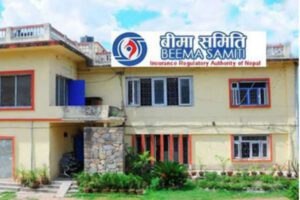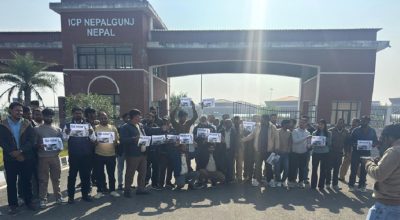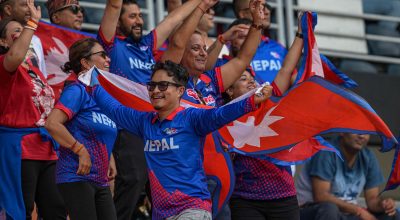
– Laxmi Bhandari/RSS
Birendranagar : Twenty-year-old Gajali Shahi who belongs to the nomadic Raute tribe residing along the forest area at Gurans rural municipality, Dailekh stays put at the corner of a hut which is shared by all members of her family during her menstruation.
Though she is not banished from home to stay in Chhaugoth unlike many other menstruating women of other castes in the area she keeps herself refrained from cooking.
Chhaugoth is a separate hut where menstruating women are made to stay in.
“During my period, I do not cook food,” she said. In local parlance, they call the menstruation period ‘chhui’ and when they are observing ‘chhui’, they are not supposed to cook and touch food and perform a puja, sixty-year-old Durshi Shahi talked about the tradition.
“We do not send our menstruating daughter out of home during their periods. Instead they stay within the house,” she said.
Similarly, 21-year-old Singi Shahi is habituated to take the corner of a hut once in a month. “We do not prepare food and touch water when we are observing the monthly cycle. We are asked to take a regular bath during the period. ”
The community is totally unaware about the sanitary pads. Women in monthly periods use a piece of thick ragged cloth to prevent the leakage and throw it after it becomes wet.
They being the members from the nomadic community have their own stories about the natural phenomenon. “It is painful if we have to move from one place to another during menstruation,” shared one Golpi Shahi, adding they were not supposed to disobey the order of a community leader (who is known as Mukhiya and makes decisions for the community) and it causes us more pain if we are menstruating during the travel.
They seem not aware of menstrual hygiene as well. As they said, they just use a piece of thick cloth without any help of inner garments. It means they do not wear under garments even during period.
Their leader Mahin Bahadur Shahi shared that women members in the community are allowed to stay with the house during period. They are kept within the house (but in isolation) bearing in mind of possibility of security issues outside, according to him.
The rules for observing period are different for women who are not married and those who have already entered motherhood. In case of unmarried girls and women, they have to follow the rules for seven days and it is five days for mothers.
“If menstruating women in our community cook food, it will make our God angry, so we made certain rules for them,” the community leader tried to justify logics for putting limitations on menstruating women.
The case of Raute women in other districts in Karnali and Far-Western Province is different than of Dailekh. The Raute women there during menstruation are sent to a Chhaugoth some far from their homes for the first seven days and it is taken as a positive move that women from the same community here at least stay inside house.
Local Satyadevi Khadka is among those who support this idea. She insisted that areas where the Chhaupadi (a socio-cultural practice that banishes menstruating women from home) exists at least should take a lesson from the practice here.
Raute Upliftment Academy, Karnali state coordinator Krishna Devi Oli also stressed other communities should learn something from the Raute people here.
Teacher for the Raute community Durga Thapa explained the Ratue community here are is a step ahead than their colleagues in other parts in terms of breaking harmful socio-cultural barriers to some extent.
She is, however, concerned about lack of awareness about proper menstrual hygiene among the community residing at Gurans rural municipality. They in total make 140 in number and the number of female is 54.
—












